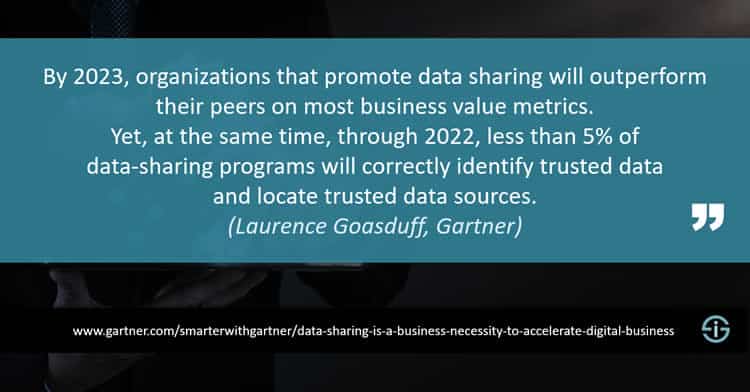The term ‘data sharing’ – thus far – has been mainly used in the academic context of scientific research. However, in recent years, ‘data sharing’ has become increasingly important for digital transformation and innovation from a digital business perspective.
In several countries and regions, initiatives have been taken to accelerate data-sharing and drive business growth in an increasingly digital economy, often within vertical industries.

All data-sharing initiatives strive to unlock the value of data sharing, but each has a unique signature (Data Sharing Coalition)
Increasing attention for data sharing across the globe
We previously mentioned an example of a company dedicated to data sharing and the applications it enables between various stakeholders in port ecosystems, NxtPort, in an article on a blockchain smart port initiative.
The success of NxtPort and its Data Utility Platform, which aims to unlock the potential of sharing existing data between various players in the port, has led to more projects supporting the global supply chain.
In Flanders, the part of Belgium where NxtPort is based, the government is also preparing to launch a data utility as part of the local relaunch plans, whereby the acceleration of digitalization is an aim across multiple transformation plans announced in 2021. In an interview, Barbara Van Den Haute, Administrator General of Digital Flanders (and also active in NxtPort), talks more about the how and why of the data utility that aims to kickstart data-sharing initiatives by removing multiple challenges.
Nearly 70% of CDOs acknowledge their organizations are not effective at sharing data (Gartner)
Similar evolutions are taking place in other countries and regions. For example, in the Netherlands, the Data Sharing Coalition was launched in January 2020 to be an open international initiative enabling to unlock the value of cross-sectoral data sharing. Also within the EU, several steps have been taken in the context of data-sharing, whereby there is consultation and cooperation with, among others, the mentioned initiatives.
However, the increasing attention for data sharing as an engine of innovation and transformation is a global phenomenon.
In the end, let’s also not forget that in the context of advanced digital transformation goals, data sharing, data exchanges, and data ecosystems always mattered. It suffices to look at the essence of the more mature stages in Industry 4.0 as an industrial transformation journey based on data with an obvious role for smart sensors and IoT data but also for data from data exchanges with the Industrial Data Space initiative as one example..
While the importance of data sharing might be emphasized across the globe, the approaches to make it happen can differ quite a lot, among others, from a technological and regulatory perspective.
As the Data Sharing Coalition says, pointing to some data-sharing initiatives and explaining its own position: “All data-sharing initiatives strive to unlock the value of data sharing, but each has a unique signature.”

Data sharing, innovation, and transformation: challenges and benefits
The reason for the increasing interest in data-sharing, indeed, is the same everywhere: data sharing ensures a faster evolution towards digital business and, above all, enables applications that create far more value for the initiators, participants, and target groups.
Gartner put it this way in May 2021: data sharing is a business necessity to accelerate digital business. Why? According to the company, data and analytics leaders who share data externally generate three times more measurable economic benefit than those who do not.
Barbara Van Den Haute calls data sharing an engine of innovation and transformation in which data sharing between public and private sectors is becoming an increasingly large domain.
So, data management and data creation are no longer enough. That’s what Gartner says. On the other hand, data management is anything but simple in a world of ever-increasing data volumes and the proliferation of types of data and data sources.
Moreover, there are many other challenges involved in data sharing that start way before you can even consider sharing. And they’re not just related to data maturity or challenges with data management.
Many organizations inhibit access to data, preserve data silos and discourage data sharing. This undermines the efforts to maximize business and social value from data and analytics (Gartner)
If personal data is involved, there is the issue of data privacy, for example. Therefore, the Flemish government has chosen to work with Solid’s data pods for its data utility, making it the first government to do so. As a reminder, Solid is the brainchild of Tim Berners-Lee and enables to leave ownership and control over personal data to people. In the vision of the Flemish government, the data utility company is a data interchange whereby participants in ecosystems are granted a right to use the data they need for their data-enabled applications.
According to Ruben Verborgh, professor of Decentralized Web technology at IDLab, Ghent University – Imec, and research affiliate at the Decentralized Information Group of CSAIL at MIT, with Inrupt and Solid, we can create a data ecosystem that fosters sustainable innovation. Verborgh, a Solid advocate who will work with the data utility, explains why “halting data harvesting is, paradoxically, how companies can leverage more data towards their services instead of less” on his blog.
Analysts also point out that data sharing isn’t a matter of having a data creation culture but a data-sharing culture.
In addition to this shift away from ownership/creation and the importance of privacy when personal data is involved, there is also an emphasis on “trust” in data-sharing. When thinking about trust and technology, one often thinks about blockchain technology. For Gartner, organizations should adopt digital trust technologies, such as blockchain smart contracts to collect data securely and efficiently transfer and share monetary or nonmonetary value assets.
We need to start thinking about how to leverage existing data (Ruben Verborgh)
Regardless of how exactly data-sharing initiatives are or will be regulated, what approaches will be taken, and what governments and companies will do: data sharing is clearly a fast-developing field. We will look at some approaches, advice, and examples in further articles, including the Digital Flanders initiative.
In the meantime, here are two predictions from Gartner: “Gartner predicts that by 2023, organizations that promote data sharing will outperform their peers on most business value metrics. Yet, at the same time, Gartner predicts that through 2022, less than 5% of data-sharing programs will correctly identify trusted data and locate trusted data sources.”

